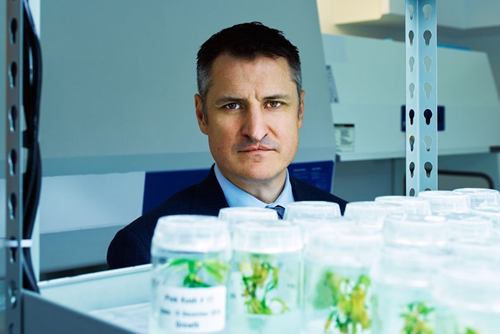It’s just after 6, on a pitch-dark morning in December, and Brendan Kennedy is standing over the stove, wearing shorts and a vest, meditatively melting butter in a pancake pan. It will be nearly two hours before the sun cracks the Seattle sky, and Kennedy, toddler son in tow, already has the pensive look of a man trying hard to keep the creep of the workday ahead from encroaching on a family ritual.
See, morning is a sacred time for the 46-year-old CEO, who has two rules for starting the day: Always eat breakfast. Don’t eat with anybody but your kids. Though abiding by rule No. 2 means eating alone, if he’s on the road—which is a lot these days, particularly since Kennedy’s company, Tilray, went public in July. In a couple of hours he’ll board his 135th flight of the year—a stat he can tell you because his assistant, knowing how he relishes data, sends him monthly analytics on his own travel (in 2018, he flew 23% more miles than he did the year before). At the moment, though, his 4-year-old daughter, in a pink tutu, is stirring the batter skeptically from her perch atop the kitchen island. “Papa, I think you forgot the flour,” she chides. Kennedy’s family moved into the new house a few weeks after Tilray went public, and he still struggles to find things in his own kitchen. He shrugs as he begins scrambling eggs and frying bacon in another pan: “My kids say pancakes are the only thing I’m good at.”
Of course, his children are too young to know that what their dad is really good at is—at least for the moment—illegal in much of the U.S. and the world. Tilray sells cannabis, a.k.a. pot, weed, and more than 1,000 other colorful nicknames, for the medical-marijuana market and, more recently, the recreational one. It wears the crown as the hottest IPO of 2018, returning 315% for the year and valuing the Canada-based but American-run company at $9 billion today. The kids don’t know that the IPO—his daughter got to help ring the bell at the Nasdaq—made Kennedy not only a billionaire but the richest man in the legal marijuana business, and maybe the face of its future. Or that after pancakes today, he’ll shake hands with officials at Anheuser-Busch InBev, the behemoth behind Budweiser, to form a $100 million partnership aimed at creating a cannabis-infused substitute for beer.
Tilray’s 50% contribution to that venture exceeds the estimated $45 million in revenue it made in 2018, a year in which its estimated losses hit $47 million. But AB InBev’s desire for a deal is just the latest sign of Big Business’s belief that widespread cannabis legalization is an inevitability, and that Tilray—a global operation founded by finance veterans and data geeks with minimal interest in, um, testing the product themselves—will be uniquely poised to capitalize when Big Cannabis goes mainstream.
Brendan Kennedy and his family, center, ring the Nasdaq bell at Tilray’s IPO in July 2018. Bebeto Matthews—AP/REX/Shutterstock
The day before the predawn pancakes, Kennedy and I had boarded a 10-seat Cessna prop plane at Seattle’s Boeing Field for an hour-long flight to Tilray’s official headquarters, in Nanaimo on Vancouver Island in British Columbia, the lush, rugged province renowned among cannabis connoisseurs for its “BC bud.” It was cold enough to see your breath inside the plane. Preparing for takeoff, the pilot laid out a short list of stipulations: “Stay buckled, no talking on the phone, and no cannabis products on board.” Marijuana became fully legal in Canada on Oct. 17. But flights crossing the border have nonetheless been warning passengers that the U.S. government still prohibits taking the drug with you—even when traveling from Washington State, where recreational cannabis has been legal since 2012. Then again, why push your luck? As a Canadian customs officer once put it nonchalantly to Tilray employees, “It’s just like bringing sand to the beach.”
Flying north from Seattle, the 360-degree view features Mount Rainier behind you, Mount Baker to your right, and Mount Olympus on the left. In the summer, when it’s easier to go via low-flying seaplane, you can often glimpse a pod of orcas swimming just beneath the surface of Puget Sound. On the ground in Nanaimo, Kennedy is something of a local celebrity, having quickly become one of the largest employers in a community of 92,000 people. We clear customs without a word and proceed to Tilray’s 65,000-square-foot cannabis lab and grow facility, where the whiff of freshly cut marijuana floods your nostrils as soon as you open the heavy steel door. The combination of the pharmaceutical-grade warehouse setup and the presence of thousands upon thousands of pot plants gives it the sterile but earthy smell of a Home Depot garden department—you know, if Home Depot sold weed. From here, the product will be shipped to tens of thousands of patients, as well as pharmacies and dispensaries, in 12 countries where medical or recreational pot use is legal.
But we haven’t even made it past the vestibule when a facilities employee named Rudy stops the CEO in his tracks. “I never got to say thank-you for the whole stock thing,” he tells Kennedy, shaking his head reverently. “What a gift. Such a life changer, a game changer. The thought of being a Tilionaire one day.”
Kennedy swears this wasn’t a scheduled part of the tour. He claims he’s never even heard the expression “Tilionaire,” although his stock—which he’s doled out to all 750 of the firm’s employees, at all levels—has made many people much richer. He has yet to sell any of his own shares (and promises he won’t do so when post-IPO restrictions lift in January), meaning his 10-figure wealth is still only on paper. Kennedy, who previously started and sold two dotcom-era software companies before getting an MBA from Yale, claims he didn’t anticipate the investor frenzy that Tilray ignited as the first cannabis producer to go public on a major U.S. exchange. “We were caught off guard,” he says.
Indeed, virtually the entire business world is grappling with the sudden arrival of cannabis as a force of disruption, even as marijuana teeters on the grayish line of legitimacy. Pot is now legal for either medical or recreational use in some 36 countries and 33 U.S. states plus the District of Columbia. And while its use and sale remain illegal in the U.S. at the federal level, many on Wall Street and beyond see that changing too. The recently passed Farm Bill exempted the hemp plant and its derivative cannabidiol, or CBD, from the federal ban, clearing the way for an anticipated surge in a product category that in some states has already swept across store shelves and café and cocktail menus. A new report from Arcview Market Research and BDS Analytics forecasts that legal pot sales will more than double from $10.5 billion in 2018 to $22.2 billion in the U.S. in 2022, and to $31.6 billion worldwide. By then, Kennedy and others expect the U.S. will have legalized the drug, an issue that could even dictate who wins the 2020 presidential election.
Chasing this buzz, U.S. industries, including Big Beer, Big Tobacco, and Big Pharma, have made bets on cannabis companies, observing that consumers are increasingly turning to the drug as an alternative to booze, cigarettes, and painkillers. That has fueled tie-ups like Tilray’s with AB InBev, as well as a global distribution deal Tilray struck with Sandoz, a division of Swiss drugmaker Novartis, for co-branded cannabis oils and pills to treat ailments such as epilepsy, sleep disorders, and post-traumatic stress—the only partnership to date between a cannabis company and a big drug company. Elsewhere, Constellation Brands, which makes Corona, and Marlboro cigarette purveyor Altria have made multibillion-dollar investments in Canadian cannabis companies.
Tilray’s facility produces cannabis oils (left), a staple of its partnership with a division of Novartis, as well as medical-grade marijuana flower for smoking, worth nearly $10,000 per bag. Photographs by Spencer Lowell for Fortune
Yet for all that interest, most money invested in marijuana is leaving America.
Public and private cannabis companies raised $13.9 billion in capital in 2018, quadruple the previous year’s total, according to Viridian Capital Advisors, an investment bank that tracks cannabis deals. Of that sum, however, 69% was invested outside the U.S. As long as cannabis remains federally outlawed, American businesspeople have to reckon with the liability of, technically, aiding and abetting illicit activity, a risk many have decided is not worth taking. “It’s kind of a damn shame that so much capital has escaped the U.S. to go up to Canada,” says Scott Greiper, Viridian’s president and founder. For now, Cowen, the lead U.S. underwriter of Tilray’s IPO, won’t take any U.S.-based cannabis companies public, says CEO Jeffrey Solomon: “Until there’s clarity on federal law broadly, we’re going to continue to focus on the rest of the world.”
That makes Tilray even more of an outlier. It was not only the highest-flying IPO of 2018, according to Renaissance Capital, but also one of the top 10 performers in the U.S. stock market. That ironic result was possible under stock exchange rules because Tilray operated exclusively outside America. The company will only do business in jurisdictions where cannabis is federally legal, and it has had zero U.S. sales to date. As a result, the only Americans who have so far enjoyed the fruits of its economic contributions are stock investors and its U.S.-based employees (including its entire C-suite).
Kennedy, whose predictions about legalization have been profitable so far, believes an end to the U.S. ban is close at hand. But for now, the precarious legal dynamic gnaws at him every time he crosses back from Nanaimo into his native country. “I would not mention what we just did,” the CEO quietly advises as we sit on the tarmac in Seattle again, awaiting a customs officer to clear us to come home. While Kennedy has never been questioned, he has reason to be nervous: A few Canadian cannabis executives and investors have been detained at the border and even barred entry to the U.S. for life; a senior official at the U.S. Customs and Border Protection agency confirms that even American executives operating legally in Canada can face additional inspections upon their return. Adds Kennedy: “We generally don’t talk about what we do when we go back in the U.S.”
In 2014, Founders Fund, Peter Thiel’s venture capital outfit, became the first institutional investor to announce a stake in the cannabis industry. Geoff Lewis, the partner who led the investment (and has since started his own fund, Bedrock), had the same experience with a dozen cannabis startups while looking for one to back. The owners would offer him a “product sample” or ask “if I wanted to smoke a joint”—something that was illegal at the time because Lewis didn’t have a medical marijuana prescription. The first entrepreneur who didn’t offer him a taste? Brendan Kennedy. “And that’s what I wanted to invest in—I wanted a team that didn’t use cannabis,” says Lewis. “It was about founders who were living by the line of the law.”
Kennedy can count on his fingers the number of times he tried pot before going into the business. He grew up in San Francisco as the sixth of seven children; his siblings would smoke, but Kennedy shied away. “I’m probably the quietest one of the bunch,” he says. He was born with a cleft lip that required repair surgery when he was 8 days old; his parents, fearful for his welfare, summoned a priest to baptize him before he even left the hospital. During his time at the then all-boys Jesuit prep school St. Ignatius—where his dad was a science teacher—and at UC Berkeley studying architecture, Kennedy worked construction. “If it was summer, I was wearing a tool belt,” he says. He later funneled his thirst for physical exertion into six Ironman triathlons. “We never got into illegal substances. It just wasn’t in our DNA,” says Christian Groh, Kennedy’s high school friend, fellow triathlete, and current partner in the cannabis business.
What Kennedy did have in his DNA was a knack for scanning data for auguries of the future and an uncanny memory for dates and figures. “Brendan thinks in terms of a timeline,” says Michael Blue, one of Kennedy’s Yale MBA classmates and the third cofounder of Tilray. After business school, he landed in 2006 at Silicon Valley Bank, working for an internal analytics startup focused on helping venture capitalists and their portfolio companies value their private stock. During the spring of 2010, the data began telling Kennedy a story about cannabis.
California was planning a ballot question on legalization that fall, and anecdotes about the issue repeatedly crossed Kennedy’s radar. Pulling Gallup poll charts on American attitudes toward controversial issues, he noticed a compelling trend: Support for gay marriage and marijuana legalization seemed to increase in lockstep, and state laws were following suit. The number of doctors willing to prescribe medical pot was steadily increasing. “It was inevitable the U.S. would legalize,” Kennedy says. “The frustrating part was, how did everyone else not see it?”
The doubts that dogged Kennedy the longest stemmed from his own ambivalence about the product. He began personally experimenting with pot after decades of abstinence, but he doesn’t remember any catharsis and didn’t like the unpredictability of the experience. His wife, Maria Chapman, says she’s never seen him high. Kennedy struggled to reconcile the enthusiasm he was hearing for therapeutic use from military vets and cancer patients with his own antidrug upbringing. “That was the hardest part from a D.A.R.E., cracking the egg on the frying pan, ‘This is your brain on drugs’ perspective,” Kennedy says. “How could this thing that Nancy Reagan said was so bad be a medicine that people use?”
At the same time, Kennedy was troubled by the law’s failure to distinguish marijuana from other narcotics like heroin, even as cannabis seemed to truly help people without putting them at risk of an overdose. “You probably will never see it, but he’s a real softie for those types of things, and it really affects his heart,” says Chapman. “It’s not all business.” Kennedy and several of his backers felt they were doing more than starting a company or going public. In some ways, they were building a field of dreams within cannabis—give people a bona fide market, and investors and politicians will come. “Our IPO—I’ve always said this is really an important form of political activism, against prohibition,” says Kennedy. His own non-pothead image makes him an ideal spokesperson to win over minds, says Solomon, the Cowen CEO, who has “a ‘no joke’ rule around cannabis” at his own firm. “If we can distance ourselves from the perception of Cheech and Chong, or two guys and a bong hanging out in the back of a van, then we have made huge strides in establishing this as a legitimate industry,” Solomon says.

Kennedy officially quit his job in the spring of 2011. One morning a few months later, he showed up with a PowerPoint presentation at the home of his old boss, Jim Anderson, the former president of SVB Analytics. The presentation was the genesis of Privateer Holdings, a private equity firm with a mission to acquire and create cannabis companies and brands. Kennedy made a data-driven case for how he expected legalization would unfurl. “He laid out this picture of the next 10 years,” recalls Anderson, now an administrator at the University of San Francisco. “He said, ‘I think there’s a sea change coming in opinion on cannabis.’ ” Anderson invested in Privateer’s first, modest fundraising round—a bet that has yielded a return of more than 100x since Tilray, of which Privateer owns 73%, went public. After the IPO, Anderson wrote to Kennedy: “Almost everything you predicted back in 2011 has come to pass.”
Privately, though, Kennedy and his cofounders often wondered if they were too early. Late in 2011, they spent their pooled savings (they won’t say exactly how much) on their first acquisition: Leafly, a marijuana and dispensary review site. The startup had next to no sales, but it did publish ratings on cannabis strains—sold legally or on the street—from users all over the world, providing a road map to the best pot on the planet. The lack of data in the largely illicit industry “terrified me,” says Kennedy; the Leafly purchase was “a gut decision in order to get data.”
Once they had it, they needed to monetize it. The plan was to sell advertising to dispensaries, turning Leafly into a kind of Yelp for cannabis. But Privateer struggled to attract investors, and revenue was slow to come. Soon Kennedy had drained his 401(k), maxed out his credit cards, and borrowed money from family members to pour into Leafly. He remembers emptying the jug of change next to his washing machine into the Coinstar at Safeway for a grand total of $196. There was a night when he didn’t even have enough money to order a pizza. “That was darkness unlike anything I’d ever faced,” he remembers. More than being broke, Kennedy and his partners feared what flaming out on a Hail Mary bet on pot would do to their career prospects. “We were worried we would always be known as failed pot guys,” Kennedy says.
Finally, the rest of the country started to prove Kennedy’s hypotheses. In 2012, Washington and Colorado became the first states to legalize recreational marijuana, and investors—and Leafly advertisers—wanted in. But perhaps the biggest opportunity came about almost by accident. In 2013, Privateer got a cold call from the health department of Canada, which was phasing in a new medical marijuana licensing process designed to professionalize that country’s industry. Health Canada had dozens of eager applicants who lacked funding to support a commercial marijuana grow operation and wondered if Privateer might invest. Unimpressed with the offerings, Kennedy and his partners had a different idea: Why not become growers themselves?
All they needed was marijuana. That’s where Leafly came in. The Privateer team crunched data from the site to identify the 20 most coveted, high-potency strains across Canada—creating a shopping list for themselves. Actually locating the bud was another story. “We would go and meet people at a Tim Hortons, and we would follow them down a road. Then we’d have to ditch a car,” recalls Groh. “We’d be in rooms with a lot of cash and weapons.” Patrick Moen, who left his job at the U.S. Drug Enforcement Administration to join Privateer in early 2014 and now serves as general counsel, accompanied Groh, typing up contracts on a laptop and handing out checks to backwoods cannabis growers. “It reminds me of my undercover days early on at DEA, you know, except I had backup,” says Moen. “I look back on it, and I’m like, What the hell was I thinking?”
Those plants—from Master Kush to Island Sweet Skunk—were transported live to Nanaimo, in refrigerated trucks that rode the ferry to Vancouver Island, where they became the foundation of Tilray and its brand portfolio. Today, the genetic clones of more than 60 different “mother” plants grow in specimen jars in an R&D lab at Tilray’s headquarters. They, in turn, have propagated Tilray’s newer production facilities in Ontario and Portugal from scratch, a strategy the company will continue to employ as it scales up. “When you go to Starbucks—doesn’t matter if you go in Seattle or Iowa—and you order a caramel macchiato, you expect it to be the same everywhere. You can do the same thing for cannabis,” says Cowen’s Solomon. “Brendan and his team understood early on that their success is in their ability to deliver that kind of consistency.” The team has taken other cues from Starbucks too: To come up with the Tilray name (“til” as in tilling land, crossed with a sun ray) and logo, Kennedy hired the design firm of Terry Heckler, who created the iconic Starbucks mermaid emblem.
Tilray’s logo now appears on its dried (smokable) marijuana flowers, ingestible oils, and capsules. Each is packaged like prescription pills in bottles marked with the concentration of THC (the psychoactive ingredient that makes people high) and CBD—and, in Canada, warning labels about adolescent addiction. The company first recorded sales in April 2014 and had $5.4 million in revenue in 2015. This year, Wall Street expects sales to more than quadruple, to around $186 million, from $45 million last year. Tilray should also pass a major milestone in 2019: In January, it unveiled plans to release newly legalized CBD-infused products, from whey protein to sunscreen, in the U.S.—a move intended to give the company U.S. revenue for the first time.
To stay ahead, Kennedy spends a lot of time trying to predict which country will be the next to legalize marijuana, so that Tilray will be there when it does. This summer, he commissioned a model with 99 different inputs, from gay marriage’s legal status to a country’s dominant religion, to predict medical and adult use legalization. So far, it has given him an early heads-up on South Korea, which in late November stunned the world by legalizing medical cannabis.
As we exit Tilray’s Nanaimo warehouse, Kennedy excitedly notices the grass outside the building: “The lawn looks really good!” The last time he was here, he explains, the yard was overgrown with weeds—making a poor first impression on visitors. He let his displeasure be known inside the company. “It kind of drove me nuts,” he says. “We’re supposed to be growing things!”
Tilray workers fill an extractor that turns dried marijuana flowers into oils and capsules at Tilray’s facility in Nanaimo, B.C. Photograph by Spencer Lowell for Fortune
The Tilray brand didn’t really gain recognition in America until July 19, when it became the first cannabis company to have its IPO on a U.S. stock exchange. The offering raised $153 million, with shares priced at $17 apiece. At the stock’s peak in September, it had risen 1,159% in just two months.
Though the debut turned Tilray into a market darling, up until then it had been treated by much of Wall Street as a sort of redheaded stepchild. Kennedy was in a rental car garage in San Diego in mid-April on his wife’s birthday trip when he got the surprise phone call from the first bank that had agreed to underwrite Tilray’s IPO—letting him know they were backing out. (He won’t say which bank.) “I had to get out of my car because I was screaming so loudly, I didn’t want to scare my children,” he recalls. A second bank later had the same change of heart: Its board had nixed the deal for “reputational reasons.” When Cowen and Canada’s BMO eventually took it public, Tilray had to pay up for the privilege. To obtain the directors and officers liability insurance required of all public companies, Tilray had to pay five times as much as the typical rate for less than half the coverage, according to CFO Mark Castaneda.
In fact, while Tilray’s business may be perceived as involving a taboo or a vice, there’s no legal reason for banks or investors to be squeamish about working with it, according to John F. Walsh, the former U.S. attorney for Colorado who is now a partner at WilmerHale. “Under U.S. law, if there is essentially drug activity going on in another country that is entirely legal in that other country, it is not a U.S. federal narcotics crime,” Walsh says. Importantly for investors, he adds, that means Americans who finance such a “foreign legal marijuana business” would not be violating U.S. anti–money laundering laws: “It is pretty clear-cut.”
Yet no one imagined Tilray would soon be worth more than Snapchat. Kyle Lui, a partner at DCM Ventures, strikes a wistful tone when he admits that he passed on investing in Tilray when it raised money privately, balking at its nearly $1 billion valuation, in early 2018. “I don’t think we could have anticipated that the public markets in the U.S. would have received Tilray to the extent that they have,” says Lui.
Even after retreating more than halfway from its peak, Tilray’s stock is the poster child of the so-called marijuana bubble. Valuations like Tilray’s—trading at around 50 times estimated sales—have rarely been seen since the dotcom boom, says Chris Brown, founder of the $111 million hedge fund Aristides Capital. Brown didn’t even bother to model Tilray’s future sales before deciding to short it, a move that so far has earned him nearly $1.5 million: “When the price for something is so high, I think the onus is on Tilray to be the most perfect, magical, wonderful exception in the world.”
That world is a highly fractured one. Tilray has the largest international footprint among legal-weed companies and is cannabis’s second-biggest player (after Canada’s Canopy Growth), but its estimated market share is only 8% in Canada, and less than 1% everywhere else. Still, Moez Kassam, cofounder and principal of Toronto hedge fund Anson Funds, which financed most of Canada’s public cannabis companies, was convinced after visiting Nanaimo that Tilray would eventually take the lead. “You knew this was a best-in-class business,” Kassam says. “I think Tilray will be considered cheap in a few years.”Kennedy in Tilray’s Nanaimo grow facility. “It was inevitable the U.S. would legalize,” Kennedy says. “The frustrating part was, how did everyone else not see it?”
Even Kennedy, previously a valuation expert, has trouble putting a number on how big Tilray could be. For the foreseeable future, he notes, his priority is growth, not profit. (“Think Amazon, not Kroger.”) Because black market sales dwarf legal ones globally, it’s impossible to size up true demand for cannabis, or how large it might become. Legalization will enable clinical research that could discover veritable Russian nesting dolls of new uses for cannabis’s hundreds of compounds, but that research could also bring new complications: Initial studies show possible ugly side effects to regular pot use, from dependence to psychosis.
Legalization also means more competition—including from small American operators currently confined to states that have legalized—and the price pressures of what is ultimately a commodity-driven business. Kennedy has already become familiar with the singular joys of agriculture. Before Tilray could open its Ontario marijuana farm, it first had to harvest the red and green peppers that were growing there. Then there’s the matter of the bugs. In lieu of pesticides, Tilray spends about $100,000 a month on insects that eat other pests (they arrive in pouches that look like tea bags).
In five years, Kennedy hopes, 90% of the pot Tilray sells will be cultivated by other companies. “I never thought, ‘In my next business, I want to be a farmer,’ ” he says. Rather, he models himself after Joseph Kennedy (no relation), the patriarch of the political dynasty who, as Prohibition was sunsetting, traveled abroad acquiring import rights to liquor brands like Dewar’s Scotch whisky and Gordon’s gin. And Brendan Kennedy has complete conviction that “the end is near” for U.S. cannabis prohibition. “I don’t know when the Berlin Wall will topple over, but we’re getting closer and closer to that point,” he says.
It may happen sooner than people think, thanks to the drumbeat of next year’s presidential election. More of the public now views marijuana as a salve for confounding problems from the opioid crisis (overdose deaths dropped 21% to 25% in states with medical marijuana laws, a 2018 study by the think tank Rand found) to government deficits. Democratic hopefuls have signaled they will champion the issue. On the other side of the aisle, a recent Gallup poll found 53% of Republicans now support legalizing marijuana. That shift is owing in part to a concerted effort by advocates to reframe the debate in terms of states’ rights.
Among the people persuaded by that argument is President Trump, who has pledged to back legislation that would protect states’ marijuana laws from federal interference. And in a fraught campaign season, legalization could be a winning play. “We could envision a scenario in 2020 where the Trump administration could actually deem it politically advantageous to co-opt the issue from the Democrats and come out the hero,” Vivien Azer, an analyst at Cowen, told reporters in early January.
If Kennedy were setting a line in Vegas, he likes to say, he would pick 2021 as the year the U.S. will legalize cannabis. If he’s wrong, and the U.S. doesn’t budge? Not the end of the world, he says; he expects medical legalization to double to 70 other countries by then. Sure, as an American business leader, he’d feel let down by his government: “They’ll basically be ensuring that the companies that dominate this industry in the next decade are all based outside the U.S.” For the CEO of a Canadian company, though, that’s not really a problem.
A version of this article appears in the February 2019 issue of Fortune with the headline “Wall Street’s Contact High”
(Fortune)



























